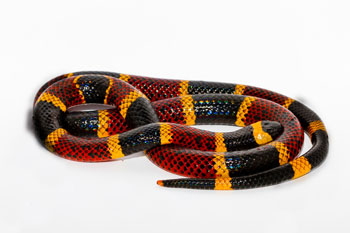“If it was a snake it would’ve bit me!”
Most of us have heard this expression, but how common are snake bites anyways? About 7,000 people are bitten by venomous snakes in the U.S. annually.
However, venomous snake bites are usually not deadly. 1 out of 500 venomous snake bites result in death, this averages to 1-2 people in Texas each year. About half of all venomous snake bites are “dry.” A “dry” bite is when a snake does not inject their venom into the victim.
Texas’ 2 Venomous Snakes
Pit Vipers
Pit vipers are a group of viper snakes that include the copperhead, cottonmouth and rattlesnake. These are the most common venomous snakes in Texas.
Pit vipers have a unique, heat-sensitive pit organ between each eye and nostril. This receptor allows them to more accurately aim strikes at warm-blooded prey. Their pupils are vertically elliptical and they have a single row of scales on the underside of their tail.
Copperheads are the most common pit viper in the United States are notoriously aggressive. Fortunately, their venom is mild and rarely fatal to humans.
Be Wary Of Look-Alikes!
Like many creatures in the animal kingdom, pit vipers have several non-venomous look-alikes. It’s not uncommon to come across snakes that have similar coloring and patterns to their venomous counterparts.
Texas Coral Snake
 The Texas Coral Snake can easily be identified by the red, yellow and black color bands along the snake’s body. The Texas Coral Snake is the only snake in Texas with touching red and yellow bands. Not sure if the snake is friend or foe? Remember the old saying, “red on yellow, kill a fellow” when looking at the snake’s color bands.
The Texas Coral Snake can easily be identified by the red, yellow and black color bands along the snake’s body. The Texas Coral Snake is the only snake in Texas with touching red and yellow bands. Not sure if the snake is friend or foe? Remember the old saying, “red on yellow, kill a fellow” when looking at the snake’s color bands.
What You SHOULD Do If You or Someone Else is Bitten by a Snake
The Texas Department of Health Services provides valuable tips on how to react to snake bites. If you or someone you know are bitten:
- Try to see and remember the color and shape of the snake. This helps doctors treat the bite more effectively.
- Keep the bitten person still and calm. This can help slow down the spread of poisonous venom.
- Seek medical attention as soon as possible.
- Call 911 or your local Emergency Medical Services (EMS).
- If you cannot go to the hospital right away, apply first aid to the bite. Cover the bitten area with a clean, dry dressing.
What You SHOULD NOT Do If You or Someone Else is Bitten by a Snake
- Do not pick up the snake or attempt to trap it. This may put you or someone else at risk for being bitten.
- Do not apply a pressure or a tourniquet to snake bites.
- Do not slash the wound with a knife.
- Do not attempt to remove the venom by sucking it out.
- Do not apply ice or immerse the wound in water.
- Do not drink alcohol as a pain killer.
To help keep Texas families safe, we have created this handy infographic with the basics of handling snake bites.

